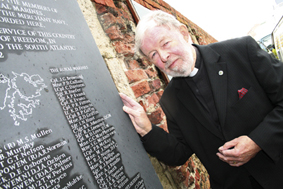Cathedral hosts Falklands memorial service
IT will be a poignant moment as we remember loved ones lost during the Falklands conflict.

Canon Roger Devonshire at the Falklands Memorial in Old Portsmouth
Portsmouth’s Anglican Cathedral will host a memorial service to mark 30 years since the war in the Falklands Islands. It happens at 11.15am on Sunday 6 May.
It will be the most prominent event in the city to mark the anniversary. Soldiers, sailors and air force personnel who served in the South Atlantic in 1982 will be among the congregation.
Canon Roger Devonshire, who served for 24 years as a naval chaplain, and who was on board HMS Hermes during the conflict, will preach that morning. The experience had a lasting effect on his life and faith.
Among those invited will be the Deputy Commander-in-Chief Fleet, Vice Admiral Phil Jones; Commodore Bill Walworth, head of the Royal Fleet Auxiliary; the Naval Base Commander Commodore Tony Radakin; as well as senior representatives of the Royal Navy Reserves and the Royal Marines, who served during the conflict.
The service will conclude with a Royal Marines band marching to the Square Tower where a wreath will be laid at the Falklands Memorial. It lists the names of those from the Royal Navy, Royal Marines, Royal Fleet Auxiliary and Merchant Navy who gave their lives to defend the Falklands. The cathedral choir will sing at the memorial site and there will be a salute of veterans from the South Atlantic.
The day’s events will continue with a ceremony of beating the retreat in HM Naval Base at 3pm, which also includes a parade of veterans.
The dean of the cathedral, the Very Rev David Brindley, said: “This will be a service that remembers the local impact of the Falklands conflict on families in Portsmouth, and pays tribute to the sacrifices made by many in defence of freedom.
“The Royal Navy in particular is very important to us as a city and to our cathedral. We stood alongside those naval families and supported them at the time, and we know that for many this occasion will be a reminder of their loss. But we thank God for those who made the ultimate sacrifice on behalf of others.”
Canon Roger Devonshire said: “It was one of the defining experiences of my life, without any shadow of a doubt. It made me rethink a lot of things about life and faith.
“War is actually an intensely personal experience, but you go through it with people who are your friends, colleagues and comrades. You form some very close friendships with people, and for most people you’re fighting to support the person next to you and you don’t think about anything else.
“In that kind of situation, the chaplain represents some sort of normality, some values in a world where everything else seems to be upside down.
“I had a lot of admiration for the professionalism and courage of those who were serving on board. People had been trained to do a job and they got on and did it, even though in those days people joined the Navy not expecting to go to war.
“I did go to Goose Green with the ship’s captain and some others after the conflict for a brief service of remembrance for a pilot who had been given a military funeral by the Argentines. And we did visit the governor in Port Stanley.
“I imagine when I preach in the cathedral, it will bring back memories of getting very close to people, the friendships I formed, and the questions I was asked. And when I think back to it now, I realise that whatever we went through, it was worse for the families back home, as they didn’t know what was happening.”
The city of Portsmouth has also signed an armed forces covenant, which aims to ensure military families don’t miss out on services like education, housing and health.
The covenant aims to improve support for members of the armed forces, veterans and service families. It means they don’t lose out when having to move to new areas and have to find schools and GPs, and also helps the injured, the bereaved and those who leave the armed forces.